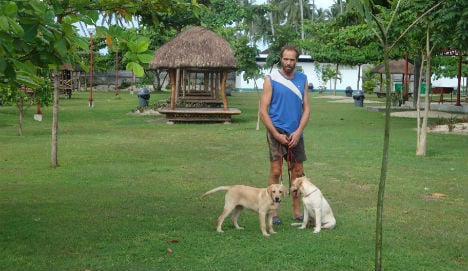Gunmen seized the men, including a Dutch and a Swiss, on a tiny island that is part of the Tawi-Tawi archipelago and forced them onto a speedboat, regional military spokesman Lieutenant-Colonel Randolph Cabangbang told AFP.
One of two Filipino guides accompanying them was also abducted while the second escaped and reported the crime to authorities, he added.
The trio were identified as Swiss national Lorenzo Vinciguerra, 47, Dutchman Ewold Horn, 52 and Filipino guide Ivan Sarenas, 35, with police sources in the area saying they were on a birdwatching trip.
Sarenas is a member of the Wild Bird Club of the Philippines and frequently visits Tawi-Tawi, the club’s treasurer, Michael Lu, told AFP.
“We are aware that Ivan was in Zamboanga (southern city near Tawi-Tawi) with two foreigners,” Lu said.
“He had been a frequent visitor to Tawi-Tawi and he is the only person I know who has pictures of rare birds from that area, such as the Sulu hornbill.”
The Dutch foreign ministry refused to confirm the abduction at present and said it did not know the identity of the person kidnapped.
Cabangbang said the military did not yet know who abducted the trio.
But immediate suspicion fell on Islamic militants who are based in the southern Philippines and frequently kidnap foreigners as well as locals in efforts to extort ransoms.
The Al-Qaeda-linked Abu Sayyaf is the most infamous group based in the south, but other bandits and kidnapping gangs also roam the often lawless area that is close to Malaysian waters.
A rotating force of 600 US troops have been stationed in the southern region of Mindanao for a decade, helping to train local soldiers how to combat the Abu Sayyaf and other Islamic militants.
Wednesday’s abductions lift the number of foreigners kidnapped in the southern Philippines since the beginning of last year to more than 10.
Five of them — an Australian, two Malaysian traders, an Indian married to a Filipina and a Japanese man — are still in captivity. Three abducted Filipinos are also still being held.
The Australian, 53-year-old Warren Rodwell, was kidnapped from his home in a southern town in December and appeared in a video released to media last month in which he said his adbuctors were demanding $2 million for his release.
“To the Australian embassy here in the Philippines, this is your constituent appealing for his life, his safety. Please help facilitate,” Rodwell said.
In 2000 the Abu Sayyaf kidnapped 21 mostly European tourists from a Malaysian island resort and brought them by boat to the Philippine island of Jolo, not far from Tawi Tawi.
The hostages were ransomed off after many months for millions of dollars, with Libya brokering the deals and facilitating their release.
The following year the Abu Sayyaf kidnapped three Americans along with a group of Filipino tourists from a southwestern Philippine island resort. One of the Americans was beheaded and another was killed during a rescue attempt.
The Abu Sayyaf was founded in the 1990s with seed money from Osama bin Laden’s Al-Qaeda network.
It is believed to have only a few hundred militants but is blamed for the country’s worst terrorist attacks, including the bombing of a ferry in Manila in 2004 that killed more than 100 people, as well as the kidnappings.


 Please whitelist us to continue reading.
Please whitelist us to continue reading.
Member comments